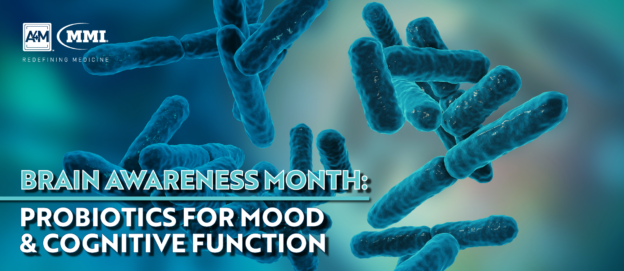June marks the beginning of Brain Awareness Month, a global campaign to raise public awareness of Alzheimer’s Disease and other neurodegenerative conditions. Increased recognition of neurological disorders has led to further clinical research and the discovery of important mechanisms of action, risk factors, and indicators of declining cognitive function. More recently, the medical community has focused its efforts on better understanding the gut-brain axis, or the connection between the human microbiome and mental health. Discoveries continue to implicate the crucial role of the gut in promoting and maintaining cognitive function, mental clarity, and a stable mood.
Numerous studies have linked proper bacteria balance in the digestive system to overall health, but an increasing number of trials reveal a further connection between the gut and brain health specifically. Probiotics, or live microorganisms ingested for the purpose of maintaining healthy gut bacteria levels, show promise as an adjunct therapy to prevent cognitive decline and improve mental health conditions.
As more and more people use probiotic products to treat and improve a range of conditions, the market of probiotic supplements has seen tremendous growth in recent years – with an estimated $3.7 billion in annual global sales in 2016. Sales are projected to rise to $17.4 billion by the year 2027.
The Benefits of Probiotics
Commonly associated with restoring balance to the gut flora, probiotics are growing in popularity as supplements with a wide range of beneficial attributes. Their consumption may offset bacterial imbalances caused by illness, medication such as antibiotics, poor nutrition, and a host of other factors. Furthermore, probiotics have been linked to improved digestive health, weight loss, and boosted immune function. Their use in the treatment and prevention of digestive conditions such as diarrhea, irritable bowel syndrome, and Crohn’s disease, has proven successful and safe, even in infants and toddlers who require additional support to recover from illnesses.
Recent insights into the role of the microbiome in cognitive function and mental health implicate probiotics as an efficacious adjuvant therapeutic method to improve mental wellbeing.
Mood-boosting Properties
Research indicates that the gut-brain connection may play a powerful role in brain and mental health. Probiotic supplementation has shown promising results in alleviating mental health symptoms, stabilizing mood, improving memory, and optimizing cognitive function. A 2015 study published in the journal Brain, Behavior, and Immunity aimed to examine the effects of a multispecies probiotic on cognitive reactivity to normal, transient changes in sad mood. Heightened reactivity is an established indicator of vulnerability to depression and an important marker for intervention. Participants who received 4-week multispecies probiotics showed a significant reduction in overall cognitive reactivity to sad mood, reduced rumination, and less aggressive thoughts. The results of this study revealed some of the initial evidence of the potential benefits of probiotics as a potential preventative strategy for depression.
A systemic review of 38 animal and human studies aimed to evaluate the effects of probiotics on central nervous system function. Supplementing with Bifidobacterium and Lactobacillus strains for 1 month was efficacious at improving mental health disorders including anxiety, depression, autism, obsessive-compulsive disorder, and promoting spatial and non-spatial memory.
The benefits of probiotic supplementation have also been observed in patients with depression. According to a randomized controlled trial of 40 patients with major depressive disorder, 8 weeks of probiotic intake decreased depression, serum insulin, and C-reactive protein levels, indicating reduced inflammation and improved mental health.
Probiotics and Improved Cognitive Function
Alongside therapeutic effects on mood and mental health illness symptoms, probiotics may have a beneficial impact on cognitive function. Emerging research published in Frontiers in Aging Neuroscience found examined the correlation between probiotic supplementation and cognitive impairment in patients with Alzheimer’s disease. The team of researchers found that probiotic administration for 12 weeks had positive cognitive and metabolic results in patients with Alzheimer’s disease, with significant improvement in mini-mental state examination. Additionally, notable changes in metabolic parameters – plasma malondialdehyde, insulin metabolism, serum triglycerides, and serum C-reactive protein levels – were present in AD patients undergoing probiotic treatment.
Although further research is necessary to elucidate the impact of probiotics on cognitive function, initial trial results are promising for the role of probiotics in preventing dementia and reducing cognitive impairment in patients with Alzheimer’s disease.
Probiotic supplementation has been linked to a wide range of therapeutic benefits, which only continues to grow. As burgeoning research indicates, supporting a healthy gut bacteria balance through regular probiotic intake may have an added favorable effect on mental health and cognitive functioning. Increasing consumption of fermented foods rich with live probiotic cultures such as yogurt, tempeh, and pickled vegetables can help promote healthy bacteria. Meanwhile, adding probiotic supplements into the diet in adequate amounts – between 1 billion to 100 billion live organisms per day – is made easy through the abundance of probiotic products on the market. However, like other dietary supplements, probiotics are not tested by the FDA and specific strains and formulations should be tailored to individual patient needs for optimal results.

